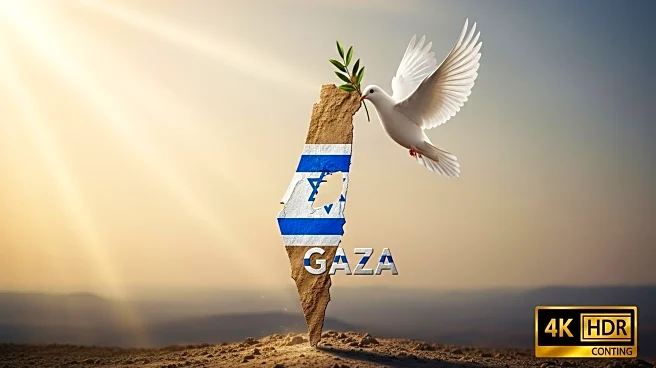What is the story about?
What's Happening?
President Trump has announced that Israel has agreed to an initial withdrawal line for Gaza, which is expected to trigger an immediate ceasefire once Hamas confirms the arrangement. The proposed plan includes the withdrawal of Israeli Defense Forces (IDF) from certain parts of Gaza, establishing a buffer zone where Gaza residents are prohibited from entering. Additionally, Israel is set to return 1,700 detainees from Gaza and 250 prisoners serving life sentences in Israeli jails, while maintaining control over key areas in Gaza. This development is part of a broader effort to facilitate the release of Israeli hostages and establish a peace deal between the conflicting parties.
Why It's Important?
The agreement on a withdrawal line and the potential ceasefire represent significant steps towards de-escalating tensions in the region. If successful, this plan could lead to a reduction in hostilities and pave the way for further diplomatic negotiations. The exchange of hostages and prisoners is a critical component of the peace process, potentially easing humanitarian concerns and fostering goodwill between the parties. The outcome of this agreement could have substantial implications for regional stability and U.S. foreign policy, as the U.S. continues to play a pivotal role in mediating peace efforts in the Middle East.
What's Next?
The next steps involve Hamas confirming the ceasefire agreement, which would activate the withdrawal plan and prisoner exchange. The international community, including major stakeholders such as the United Nations and neighboring countries, will likely monitor the situation closely. Reactions from political leaders and civil society groups could influence the implementation and success of the ceasefire. Continued diplomatic efforts may be necessary to address remaining issues and ensure long-term peace in the region.
Beyond the Headlines
The ethical and legal dimensions of the ceasefire agreement, particularly concerning the treatment of detainees and prisoners, could spark debates on human rights and international law. The long-term impact on Gaza's socio-economic conditions and the potential shifts in regional alliances may also emerge as critical considerations. The role of the U.S. in facilitating this agreement underscores its influence in global diplomacy and the complexities of balancing strategic interests with humanitarian concerns.
















